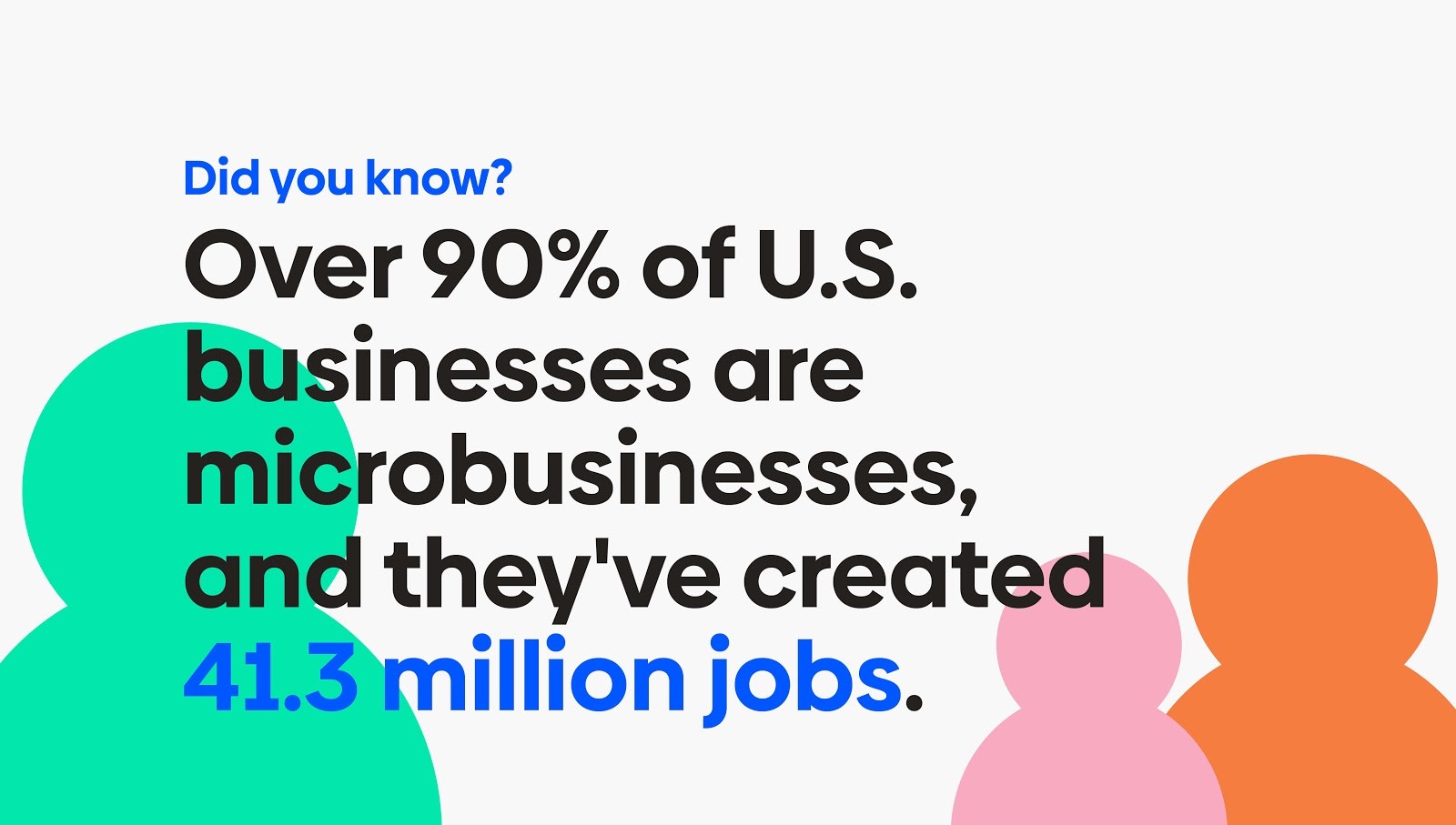What the Hell is a Microbusiness? ( And Why You Should Start One)

Over the past decade, technology has changed quicker than the blink of an eye.
Automation, repetitive tasks, and manual jobs are being gradually eliminated and replaced with algorithms and bots 🤖
There’s no doubt that living in this age brings with it many novel benefits.
For instance, take OnlyFans, a subscription-based social platform where users can sell or buy racy content 😉 Celebrity Blac Chyna rakes in over $20 million per month as the top earner.
Or even Patreon, a platform where artists and creators give fans access to exclusive content for a monthly fee. One of its top influencers, Phillip DeFranco, earns around $50,000 a month.
And let’s not forget Substack, an online platform where writers sell monthly newsletter subscriptions.
Boston College professor, Dr. Heather Cox Richardson, is currently queen of the platform with her $5 monthly subscriptions on track to bring in over a million in profits in just a year.
What larger trend is behind all of this?
Even the smallest businesses can punch far above their weight.

And these microbusiness owners are getting real money for real skills, while living lives fit to be envied.
🤔💭 But, what exactly is a microbusiness, and why would you start one? You might ask…
Well, you’ve come to the right place. Let’s dig in.
What is a Microbusiness?
Mmmm, we hate to say it, but there isn’t an exact definition for microbusinesses.
Our friends over at Wealth Fit say it’s any small business with one to five employees that’s “small, simple, and flexible.”
Whereas, the state of Vermont defines it as a business that employs less than five people and makes less than $25,000 a year.
Basically, you’ll get different answers depending on whom you talk to.
But, interestingly enough, check this out 👇🏽

Over 90% of U.S. businesses are microbusinesses, and they’ve created 41.3 million jobs.
Talk about an oversized economic impact 🚀
Oftentimes, these microenterprises are managed by a single owner with no employees (solopreneurs), and they remain as the founder’s side hustle.
This happens with freelance writers, graphic designers, front-end developers, Uber drivers, you name it.
Or, they expand and hire full-time staff or contractors, like is the tcase with SEO or content marketing agencies or Etsy store owners.
Pretty much, it’s whatever works best for the microentrepreneur and his or her microbusiness.
No one way is better than the next 😊
Microbusiness vs. Small Business: What’s the Difference?
OK, we’re going to try and explain this to the best of our abilities without splitting hairs.
First, every microbusiness is a small business, but not every small business is a microbusiness.
Depending on the industry, a small business’ description depends on the number of employees or yearly revenue.
These are the small business guidelines from the U.S. Small Business Administration:

But that’s not the only difference.
Small businesses tend to imitate big businesses with similar internal set-ups, physical offices, and other long-term financial commitments.
But just because they’re small doesn’t mean they’re not a big deal.
Maybe you’ll recognize a couple of these 25 companies that believe smaller is better - many of which are very well-known and respected in their industries.
And if not, would you believe that wikiHow is a small business? Bet you’ve heard of them.
On the other hand, microbusinesses don’t often follow these corporate frameworks.
Again, this is neither good nor bad. Just happens to be what works for them 🤷🏽♀️
Another major trait of microbusinesses? They’re made up of close-knit teams that are relatives (literally, there are lots of family microbusinesses) or act like it.
Spread the love ♥
So, Why Even Start a Microbusiness?
Wondering why the hell you should start a microbusiness?

Here are a few reasons:
1. Harness your super powers
Writer, podcaster, interior decorator, former school teacher…
Whatever you are, it doesn’t matter.
A microbusiness enables you to use your skill sets or insider knowledge to maximize revenue 💰
While most freelancers or solo consultants usually specialize in a few areas, running a microbusiness allows you to really dive deep in your niche.
Plus, niching down pads the wallet nicely, especially if you do so in low-competition industries.
On a side note, if you need ideas on what to start your microbusiness in as a solopreneur, check out our blog 21 Ideas for Your New Freelance Business in 2021.
2. Stay flexible and speedy
Does it take forever to get projects done in your current job? 😫 Feel like they just have to pass through wayyyy too many pairs of eyes? 👀
You’re not the only one.
There’s a reason why people write about how to deal with difficult stakeholders.
In short, microbusinesses are more flexible and can pivot easier than corporations and other bigger businesses with too many head honchos.
Credit this to their small-scale, which means faster turnaround times in decision making.
Say goodbye to ping ponging back and forth 🏓
3. Indulge in low overhead expenses
Money is always the name of the game.
Take it or leave it.
So, any chance you get to save some is well received 🤗
As a microbusiness owner, fewer (or no) employee salaries and minimal operating expenses equates to lower overhead costs.
Plus, solopreneurs who set up online microbusinesses pay even less, usually only their tools’ costs and monthly subscriptions.
Time for your happy dance? 💃🏽🕺🏽
We think so.

4. Create your future
As society moves into the age of the Passion Economy, people want flexible and purposeful jobs or opportunities 💪🏽
With the Passion Economy comes the rise of passive income from pursuing (you got it!) your passions!
Micropreneurs can finally come together and sing kumbaya (lol) to rejoice in being able to do what they like and work when and where they want to make money.
Most importantly, they’re free to create their future.
Long gone are the days of having a “steady” 9-to-5 😏
(As if you didn’t see that already from how the world of work may change forever due to ‘rona…)
Having a microbusiness in the Passion Economy is an excellent way to design a unique career path for yourself and attract others with similar traits and lifestyles to join the journey.
It’s never been easier to create the work life you want as a freelancer, solopreneur, microentrepreneur, or whatever you’d like to call yourself.
Yes, you may have hiccups getting started, but there are sooo many great, free resources out there with the people behind them vying for your success.
Eh-hem… We’re some of those people, and our Ultimate Guide to Becoming a Freelancer in 2021 is one of those free resources 😁
OK, enough self-promo 🤭 We’ll continue…
Despite these convincingly good reasons for why you should start a microbusiness, we must admit that it’s not all sunshine and 🌈s
3 Drawbacks Microbusinesses Face – And How to Solve Them
Running a microbusiness does have some difficulties.
Here are three of the most common challenges microentrepreneurs face, plus suggested solutions to these hitches.
Drawback 1: Financing can be difficult
In every business, financing of some sort becomes a necessity.
While securing funding can be tiring for business of all sizes, for microbusinesses, it’s even harder 😓
Basically, lenders are always looking to reduce risk as much as possible.
So unfortunately, microbusinesses can be viewed as higher risk and less stable in comparison to other businesses due to their small-scale nature.
This makes it hard for them to get financing - in the form of credit or loans - from traditional banks or online lending platforms.
Plus, microentrepreneurs aren’t an attractive option for outside investorslooking for an oversized return 🤑

The Fix: Find alternative financing
If you’re a microentrepreneur in need of startup or operational funding, you’ll likely need to explore further options, such as:
👩🏻🦰 Loans from family and friends
🏄🏽♂️ Crowdfunding platforms
🏧 Personal savings
On the bright side, microbusinesses rarely need loads of cash to kickoff.
So, these alternative methods are usually good enough to get going.
Drawback 2: Generating awareness takes time
Microbusinesses are often competing in noisy industries 🔊
(We briefly mentioned this before, but in case you missed it, check out these low-competition niche industries for a leg up from the get-go.)
Plus, they operate at a smaller scale than other larger businesses in every department – marketing, lead gen, sales, the whole shebang.
This is a handicap, competing with others that have the resources to run large-scale integrated marketing campaigns.
While big names can kill three birds with one stone, as a micro, you may not even get a stone to throw in the first place.
Sad day 😥
The Fix: Design a low-cost, high-touch marketing plan
With the rise of digital tools and social media, microentrepreneurs don’t need mass marketing to generate awareness.
As a matter of fact, the following digital marketing tools are easier to use now than ever.
Here are three affordable marketing strategies that you don’t need bucko bucks to execute:
1. Set up a website
No matter the size of your business, you should set up a website as soon as you launch your product or service.
There are loads of website builders to pick from, such as Squarespace, WordPress, Weebly, and Wix.
These platforms offer you:
💻 Professional-looking templates and designs
💳 Pocket-friendly pricing
🔧 In-built SEO features
👊🏽 And most importantly, the ability to buy and host your domain name
With their help, you literally have NO excuse not to have a website.
‘Nuff said.
2. Do social media marketing
Next, create business accounts across all major social media platforms your consumers hang out on.
Even though Facebook and Instagram are considered must-haves for their sheer size, look into YouTube, Twitter, TikTok, Pinterest, and others depending on the content you create.
🔥 Hot tip: Keep your eyes peeled on Twitch this new year if live streaming is your thing. The platform houses over 90% of all streaming content.
Anyways, it’s best to start with one or two platforms and then expand into more as you see fit.
Here are some quick tips to keep in mind:
💯 Create high-quality, authentic content (thought leadership is in!)
📆 Post consistently across all platforms, varying strategies
😊 Respond (kindly!) to all engagement
If your budget allows, explore paid media tactics, or get sponsored yourself!
HubSpot did a cool piece on how to get sponsored on Instagram, even if you currently have 0 followers.
3. Network
We don’t care who you are. Unless you live under a rock, networking is a must. Period.
This is especially true when you’re just starting out, and your first customers may be friends, family, or from your local community.
Just reach out and see how you can help. (Always asking for honest testimonials upon project completion!)
But breaking it down a bit more, networking could be physical:
🧴 Sharing free samples with family and friends
🤝🏽 Partnering with local businesses and charities
🌳 Participating in local business fairs
OR digital (honestly, this is more likely with COVID-19 upon us):
🖱 Reaching out to LinkedIn connections within your industry
📧 Sending emails to contacts about your launch
📢 Sharing updates on your social accounts
No matter how you do it, get out there and get seen. Your livelihood relies on it.
Drawback 3: Handling several roles at once can be tedious
In a microbusiness, you often have more job functions than employees.
You’re the chief executive officer, chief financial officer, creative director, head of marketing, head of sales…. everything.
It’s overwhelming 😩 to say the least. Plus, the juggling act can take a toll on both your business and personal lives.
The Fix: Use digital tools
You probably don’t have the option of delegating responsibilities to employees or contractors, like Sandy.

However, there are loads of digital tools that automate and streamline the most tedious and time-consuming tasks.
These are tools such as:
✅ Project management tools
Project management platforms make organizing and managing tasks somewhat effortless, especially among team members (if any).
Some of the most popular out on the market are Monday, Todoist, Wrike, Asana, and Trello.
With them, nothing (or very little 🤭) falls through the cracks, even if you’re working with several clients at once.
Oh hey! Whaddya know? We actually wrote a nifty Product Review - Project Management: Asana Vs. Trello.
Check it out if getting quality, up-to-date info on efficient task management tools is up your alley 😜
✅ Business accounting tools
Microbusinesses can easily lose out on tax benefits due to poor accounting.
Prevent this and track all sales and expenses, including tax-deductible expenses.
This is where business accounting software comes in for the rescue 🦸♀️
There are loads of trustworthy digital accounting tools - like Bill.com, Bonsai Invoicing, Bench, Xero and QuickBooks - that help you with:
📚 Bookkeeping
💳 Tracking sales and expenses
💸 Calculating business taxes
👨🏽 Invoicing customers
When you get your finances in a row, the rest will follow 🤑
We did another product review on a couple popular accounting tools, Product Review – Accounting Software: FreshBooks Vs. Wave.
Should help you speed up your decision some... You’re welcome 😉
✅ Appointment scheduling tools
Outsourcing time management to digital platforms such as Calendly is a game changer, especially if you run a service microbusiness.
Clients find booking online much more straightforward as these scheduling tools can be integrated into your website and social accounts.
Talk about 🔝 customer experience before you even start charging 😎
Some of these platforms also offer extra features, such as automatic reminders, booking history, and payment integrations.
Now, Tell Us. Are You Ready to Start Your Microbusiness?
If you’re a step ahead and have already launched your microbusiness, congrats on this first step! 🥳
If you’re still thinking about how to start and digesting everything we’ve just told you, well…

One of the best parts of running a microbusiness is that you can launch with low costs and risk and decide how fast you want to grow.
And if you realize you’re going down the wrong path, you just pivot. That’s it.
Remember: It’s not the end goal, yet the journey that really shapes you 🚵🏽♀️
So, go out there and create the life you want. Get that microbusiness going!
We’ll be here for you every step of the way 😍
Also, if you enjoyed this blog and are looking for more support to run your microbusiness like a boss, get early access to Boost, the only work platform you’ll need to build a meaningful business.
